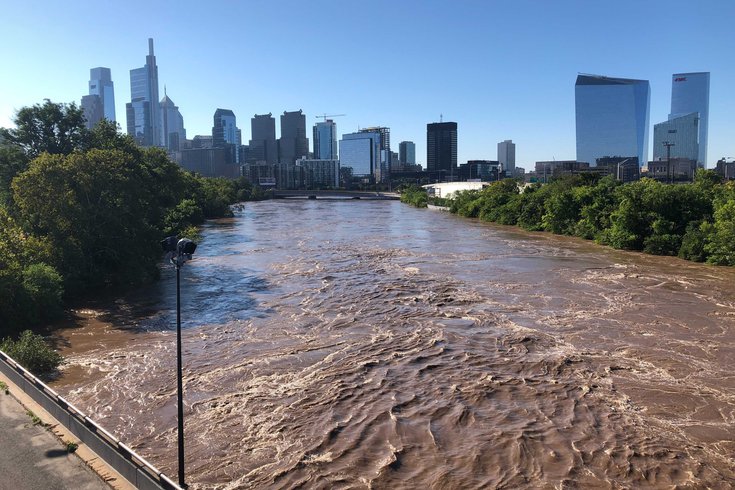
July 31, 2023
 John Kopp/For PhillyVoice
John Kopp/For PhillyVoice
Adapting to climate change will cost Pennsylvania cities and towns $15 billion by 2040, according to a report from the Center for Climate Integrity. Above is a file photo of the Schuylkill River following flooding from Hurricane Ida in 2021.
Pennsylvania's cities and towns will need to pay $15 billion by 2040 to protect residents from the impacts of climate change, according to a report published earlier this month.
The Center for Climate Integrity, an advocacy group that holds polluters accountable for climate change, analyzed municipal budgets and the costs of upgrading air conditioning in schools, expanding cooling centers, planting street trees, increasing storm drainage capacity, reinforcing bridges, maintaining roads and building protections against sea level rise and anticipated climate disasters, like flooding and landslides.
Local governments in one quarter of Pennsylvania counties need to increase annual budgets by at least 5% to address climate change, according to the report. Philly will need to spend an estimated $3.3 billion by 2040, or $190 million per year. For perspective, Philly's total budget this year is $5.8 billion.
Falls Township, Bucks County should increase its annual budget by 43% to pay for the $290 million needed by 2040 to increase its storm drainage capacity and protect against sea level rise, the report found. (Its annual budget this year is $40 million.) Bensalem and Upper Darby would need to spend $115 million each to defend against climate change.
"(Climate change) effects are being seen in the less dramatic world of local economies, with our current projected municipal, county, and state budgets starting to grapple with the costs of damaged infrastructure, increased repairs, accelerated maintenance cycles, high energy costs and lost productivity and wages," Monica Taylor, chair of Delaware County Council, told WHYY.
Flash flooding triggered by torrential downpours resulted in the deaths of six people in Bucks County earlier this month. Last week, officials in Upper Makefield Township ended the search for Conrad Sheils, a 9-month-old baby swept away during the flood.
Just before the end of the school year, high temperatures forced 91 Philly public schools to close due to lack of air conditioning. While the majority of schools were able to remain open, the School District of Philadelphia does not expect every school to be equipped with air conditioning units until 2027, the Inquirer reported.
Last month, smoke from Canadian wildfires blanketed Philly and surrounding regions in thick, dangerous smog. On June 8, Philly had the worst air quality of any major city in the world, CBS Philadelphia reported.
More extreme weather events are expected as climate change rears its ugly head. Two decades ago, Pennsylvania experienced about five days of extreme heat each year. But the report says that by 2050, 37 days of extreme heat are expected every year.
Bridges, roads and sewage systems located near the Delaware River and the state's other waterways are expected to be heavily impacted by climate change. The report says significant investments in infrastructure are needed to offset potential damage. This was evident following Hurricane Ida, when portions of Main Street in Manayunk were damaged due to flooding from the Schuylkill River.
The report also says roads, rails and other public infrastructure will be hit with rising tides, storm surges and hurricanes, with high-poverty areas most impacted by flooding.
Climate change will most heavily impact rural areas and towns with high rates of poverty, the report says.
The report suggests that Pennsylvania and its local governments file lawsuits to recover the costs of climate damage from major polluters. Neighboring states like New Jersey and Delaware have filed lawsuits against major oil companies using the same framework as previous lawsuits filed against tobacco companies and opioid manufacturers.